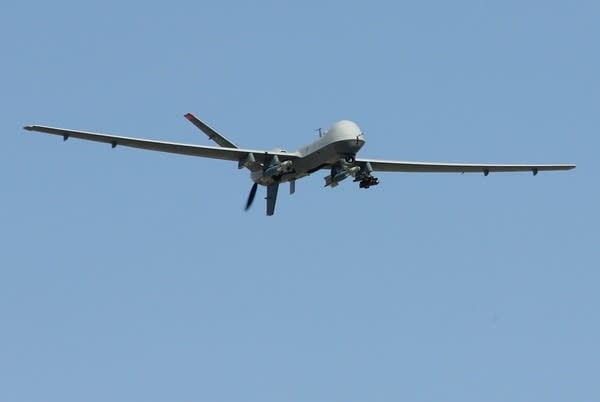Business groups push drone aviation industry as jobs generator
Go Deeper.
Create an account or log in to save stories.
Like this?
Thanks for liking this story! We have added it to a list of your favorite stories.

The FAA in 2012 will establish six test sites for unmanned aircraft. North Dakota hopes to get one of those sites, and a group of Minnesota businesses is organizing to take advantage of the growing industry.
Congress recently authorized six test sites, prompting intense competition among states. North Dakota is one of the leading states for unmanned aircraft research and education. The state hopes that status will help land a national test site designation. Those test sites will help move unmanned aircraft from a mostly military application into civilian use.
The stakes are high, said Al Palmer, who heads the Unmanned Aircraft Systems Center at the University of North Dakota. A national test center will attract companies, investment and jobs. The industry currently is primarily built around a growing defense appetite for unmanned aircraft. That will change when the FAA begins to allow unmanned aircraft in the national airspace, Palmer said.
One national study estimates the unmanned aircraft industry will create 23,000 jobs over the next 15 years. Some of those jobs could be created in Minnesota and surrounding states, if the Upper Midwest becomes one of the centers for a developing industry.
Turn Up Your Support
MPR News helps you turn down the noise and build shared understanding. Turn up your support for this public resource and keep trusted journalism accessible to all.
More states are recognizing the economic potential of this increasingly growing industry, Palmer said.
"I know that there's about two dozen states vying for these six test sites," Palmer said. "When we first started this almost a year ago there were a half-dozen."
"As soon as we gain unfettered access to the national airspace system, and that's not going to be next Tuesday, but it will come. Tremendous opportunity," Palmer said. "There are a lot of what ifs out there and it's all going to be economic development."
The economic development opportunity is earning the attention of the Minnesota Defense Alliance.
The eight-year-old organization includes large companies like Honeywell and Lockheed Martin, as well as dozens of small high-tech startups. Its goal is to reinvigorate the defense industry in Minnesota.
Defense Alliance in the past year successfully targeted defense contracts for power and energy technology, said Chip Laingen, the organization's executive director. The initiative attracted $10.5 million in contracts to Minnesota and created 250 jobs.
The organization is just starting to target the unmanned industry, Laingen said. "It's one of the few areas where defense spending is increasing.
"We can see the stars sort of aligning around this industry. The players that can contribute a lot of the innovation to this growing industry are already here. And that FAA airspace would certainly give us the ability to have a nexus that brings it all together."
The group will focus on landing defense contracts for Minnesota businesses, but Laingen said a regional industry will take off if North Dakota is successful in attracting one of the FAA test sites.
"We have a corridor here that's building very nicely, that really runs from the Dakotas through the Twin Cities, into Wisconsin, down to Iowa," Laingen said. "There's a technology corridor here that's not recognized that widely that is accelerating on its own. I think that FAA airspace is just a natural piece of that advancement."
Defense contracts are where the money is now, Laingen said, because the FAA restricts civilian use. But the companies that get defense contracts will be well positioned when unmanned aircraft begin flying in the civilian airspace, he said.
It will be a couple of years before the FAA allows unmanned aircraft for civilian use, said Gretchen West, executive vice president of the industry trade group Association for Unmanned Vehicle Systems International. Because of that, the economic development potential is still a little fuzzy.
"There's great benefits for all these civil and commercial activities and markets," West said. "However it is very difficult to predict a market, because of the regulations there really isn't much of a civil market."



